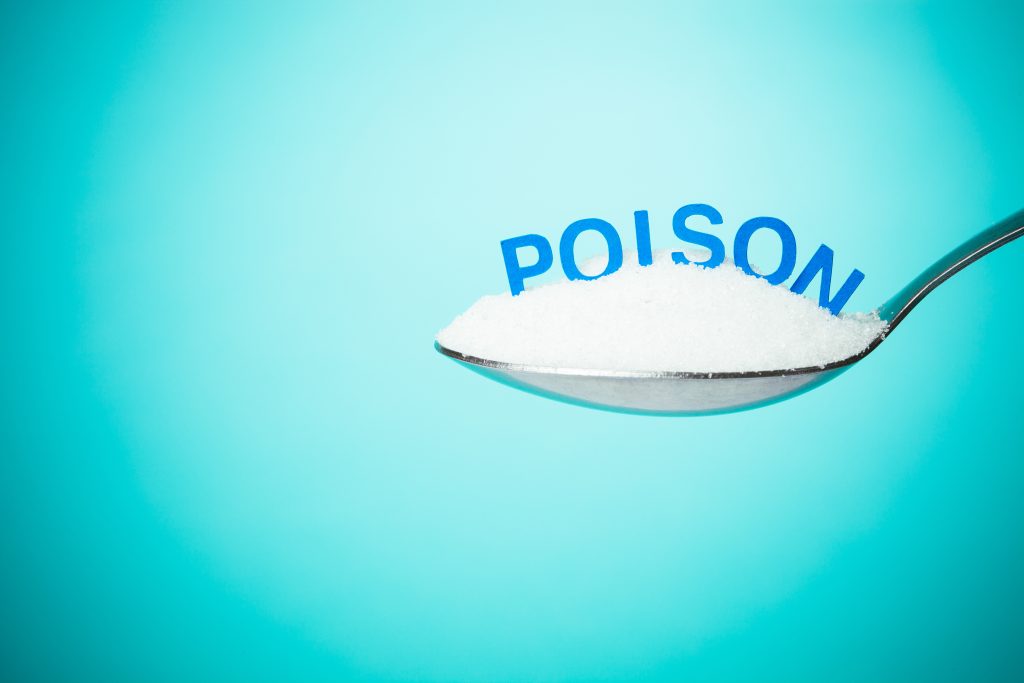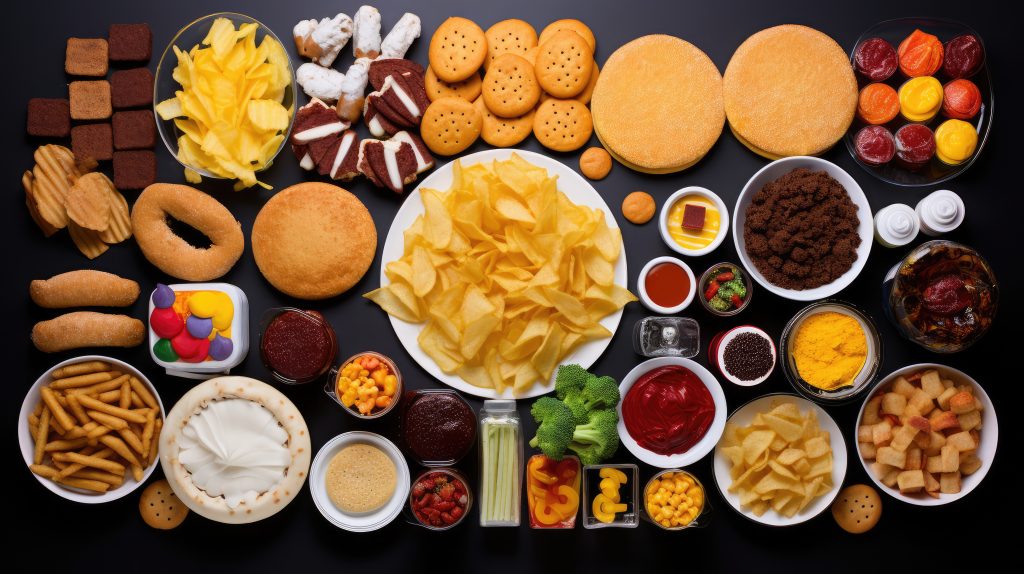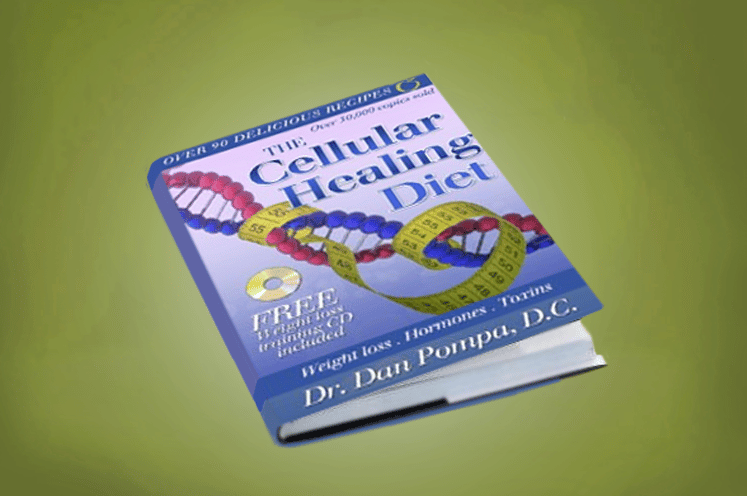Toxins In Your Food Are Making You Sick – Choose A Natural Diet That’s Easy To Follow
It’s disheartening when you realize there are toxins in your food that are making you sick. As consumers, we rely on food labels to determine the quality and safety of the products we purchase, however, food labels don’t tell the whole story. Fortunately, there is a foolproof solution to bypass this issue, don’t buy food with labels. In other words, consume whole, organic foods in the natural way they were intended to be consumed to avoid nearly all of these toxins.
Toxins In Your Food Are Making You Sick – Processed Food
Processed foods are everywhere in our modern world. They dominate the shelves in grocery stores, are readily available at fast food restaurants, and even make up a significant portion of school lunches. These convenient, easy-to-prepare meals may seem like a lifesaver for busy individuals, but they have a negative impact on our health.
Processed foods are defined as any food that has been altered from its natural state through industrial processing methods. This includes adding preservatives, artificial colors and flavors, as well as modifying the nutritional content through techniques like refining or fortification. These processes not only change the physical properties of the food, but also strip away essential nutrients and add harmful substances.
Some of the most common processed foods are chips, cookies, soda, frozen meals, and deli meats. They lack the essential vitamins and minerals that our bodies need to function properly. Consuming them regularly leads to a variety of negative health effects.
One of the most obvious effects of processed food on our health is weight gain and obesity. These foods are highly palatable, meaning they are designed to be addictive and make us want to eat more. This is due to the high amounts of added sugars, unhealthy fats, and salt, which not only makes them taste good but also triggers pleasure centers in our brain.1
Read more about what causes obesity.

Toxins In Your Food Are Making You Sick – Fast Food
One of the main reasons why fast food is so harmful is because of the high levels of toxins and chemicals found in these processed foods. These toxins are harmful to our bodies and lead to a variety of health problems, including obesity and heart disease.2
One common toxin found in fast food is trans fat. Trans fat is created during the process of hydrogenation, which turns liquid oils into solid fats. This process not only gives fast food its crispy texture, but also makes it more shelf-stable. However, consuming trans fat increases your risk of heart disease and stroke.3
In addition to these toxins, fast food also contains high levels of sugar and artificial sweeteners, which contribute to obesity and other health issues. These ingredients are often hidden in the sauces and condiments used in fast food, making it difficult for consumers to know exactly what they are consuming.
Toxins In Your Food Are Making You Sick – Sugar
Sugar is one of the most consumed ingredients in the Standard American Diet. It is found in various forms such as white sugar, brown sugar, high fructose corn syrup, and even natural sweeteners like honey and maple syrup. It’s important to read food labels and be aware of the various names for sugar, such as sucrose, fructose, and dextrose. While it may make our food taste good, too much sugar consumption has detrimental effects on our health.
Added sugars in our diet have been linked to inflammation in the body, which increases the risk of chronic diseases. This is because sugar triggers the release of inflammatory chemicals in our body, leading to a chain reaction that causes damage to our cells and tissues. High levels of added sugars in our food lead to weight gain and an increased risk of heart disease.4
Read more about the detrimental effects of sugar.

Toxins In Your Food Are Making You Sick – Sugar Substitutes
Sugar substitutes, also known as artificial sweeteners, are chemical compounds that mimic the taste of sugar but contain fewer calories or no calories at all. They are commonly used in diet sodas, low-calorie snacks, and other processed foods marketed as “healthy” alternatives to their sugary counterparts.
Despite their popularity, sugar substitutes have been linked to a variety of health issues. Studies have shown that they disrupt the balance of gut bacteria, which plays a crucial role in our immune system. This imbalance leads to a weakened immune system and increase the risk of developing illnesses.5
Furthermore, some sugar substitutes have been found to be toxic to certain types of gut bacteria, causing them to die off. This can result in digestive issues such as bloating, gas, and diarrhea. Additionally, sugar substitutes have also been linked to an increased risk of obesity.6
One of the most commonly used sugar substitutes is aspartame, which has been approved for use in over 100 countries. However, research has shown that long-term consumption of aspartame increases the risk of developing certain diseases.7
Another popular sugar substitute, sucralose, has also raised concerns regarding its safety. Studies have found that sucralose can alter the composition of gut bacteria and negatively affect blood sugar levels, potentially leading to insulin resistance.8
Read more about what negatively affects gut bacteria.
Toxins In Your Food Are Making You Sick – GMOs
One major source of concern is genetically modified organisms (GMOs). These are plants or animals that have had their DNA altered in a laboratory by adding genes from other species. While GMOs were originally introduced with the intention of improving crop yields and resistance to pests, there are many health risks associated with consuming these modified foods.
The use of GMOs has been linked to various health issues such as allergies, organ damage, and antibiotic resistance. Additionally, there is concern that long-term consumption of GMOs may lead to unknown health effects. Despite these concerns, the use of GMOs is not currently regulated in many countries around the world.9
Toxins In Your Food Are Making You Sick – Seed Oils With Rancid Omega-6 Fatty Acids
It’s important to note that not all omega-6 fatty acids are bad for us. In fact, our bodies need a healthy balance of both omega-3 and omega-6 fatty acids for optimal health. However, one of the most concerning toxins found in our food is rancid omega-6 fatty acids.
These toxic compounds are primarily found in seed oils, such as canola, soybean, and sunflower oil. These oils are commonly used in processed foods and cooking because they are cheap and have a long shelf life. The problem with seed oils is that they are highly processed and often exposed to high heat and oxygen during the extraction process. This causes the omega-6 fatty acids in the oils to become oxidized, leading to the formation of rancid compounds that cause inflammation and damage to our cells.
Studies have shown that consuming high amounts of rancid omega-6 fatty acids leads to chronic inflammation in the body, which is linked to various health issues such as heart disease and autoimmune conditions. These toxic compounds can also disrupt hormone balance and contribute to weight gain and increased risk of metabolic disorders.10
Read more about what causes autoimmune conditions.
Toxins In Your Food Are Making You Sick – Pesticides
Pesticides are a type of toxin that is widely used in agriculture to control pests and increase crop yield. They come in many forms such as insecticides, herbicides, fungicides, rodenticides, and more. Pesticides work by targeting specific organisms that can damage crops, but unfortunately, they also have negative effects on humans.
The use of pesticides has been linked to various health issues, including neurological disorders, hormone disruption, reproductive problems, and more. Children are especially vulnerable to the harmful effects of pesticides because their bodies are still developing and they tend to consume more fruits and vegetables relative to their body weight. Pregnant women also face increased risks as pesticides can cross the placental barrier and harm the developing fetus.
The most common way that pesticides enter our bodies is through the food we eat. Residue from these chemicals can remain on produce even after washing and peeling, making it nearly impossible to avoid them completely. In fact, studies have shown that traces of pesticides are present in a majority of fruits and vegetables sold in grocery stores. Additionally, animal products such as meat, dairy, and eggs can also contain pesticides if the animals were fed crops that were treated with these chemicals.11

Toxins In Your Food Are Making You Sick – Glyphosate
One of the most widely used toxic chemicals in agriculture is glyphosate, a key ingredient in the popular herbicide Roundup. Despite its widespread use, there is significant concern about the potential health risks associated with glyphosate.
Glyphosate is a broad-spectrum herbicide that was first developed by the agricultural company Monsanto in 1974. It works by inhibiting an enzyme essential for plant growth, effectively killing off unwanted weeds and crops. Glyphosate is now the most widely used herbicide in the world, with its usage increasing dramatically since the introduction of genetically modified crops that are resistant to glyphosate.12
Read more about the toxic effects of glyphosate.
Toxins In Your Food Are Making You Sick – Heavy Metals
Heavy metals enter our food through various means, including contaminated soil and water used for growing crops or raising livestock, environmental pollution from nearby industries, and improper handling and packaging of food products.
Exposure to heavy metals through our diet has adverse health effects. These toxins are known to cause damage to various organs in the body, including the liver, kidneys, and brain. They can also disrupt important bodily functions like hormone production and immune system function.
Some symptoms of heavy metal toxicity include headaches, fatigue, digestive issues, and cognitive impairment. Long-term exposure can lead to more severe health problems such as neurological disorders, organ failure, and autoimmune diseases.13
Read more about toxic heavy metals.
Toxins In Your Food Are Making You Sick – Preservatives And Artificial Ingredients
Preservatives and artificial ingredients are seemingly unavoidable in today’s food industry. These substances are added to food products to extend their shelf life, enhance color, texture, and flavor, but they also have some detrimental effects on our health.
One of the most common preservatives found in our food is sodium benzoate. This chemical is used as a mold inhibitor in acidic foods such as soft drinks, pickles, and salad dressings. However, when combined with vitamin C (ascorbic acid) or citric acid, sodium benzoate can form benzene which is a known carcinogen.14
Another common preservative is BHA (butylated hydroxyanisole), often used to prevent fats from becoming rancid in processed foods. Studies have shown that BHA may act as an endocrine disruptor, affecting the body’s hormone balance and leading to reproductive problems.15
Artificial colors are also widely used in food products, especially in processed snacks and candies. These colors are made from synthetic chemicals derived from petroleum or coal tar sources. Some of these artificial colors, such as Red 40 and Yellow 5, have been linked to hyperactivity in children and cause allergic reactions.16

Toxins In Your Food Are Making You Sick – Food Packaging
One common toxin found in food packaging is bisphenol A (BPA). BPA is a chemical used in the production of plastics and resins. It is commonly found in water bottles, canned foods, and plastic containers. BPA can leach into our food and beverages, especially when heated or exposed to acidic substances, increasing our exposure to this harmful chemical.
BPA has been linked to numerous health issues such as reproductive problems, neurological disorders, and obesity. It is especially concerning for pregnant women and young children as BPA disrupts hormone balance and affects proper development.17
Toxins In Your Food Are Making You Sick – Choose A Natural Diet That’s Easy To Follow
There is no denying the fact that toxins in your food are a major contributor to various health issues. From pesticides and additives to preservatives and heavy metals, our modern-day diet is filled with harmful substances that wreak havoc on our bodies.
One way to reduce our exposure to preservatives and artificial ingredients is to opt for whole, unprocessed foods. This includes an organic diet of fresh fruits and vegetables, fish, grass-fed meats, nuts, and seeds.
Read more about my Cellular Healing Diet.

References
1 Poti JM, Braga B, Qin B. Ultra-processed Food Intake and Obesity: What Really Matters for Health-Processing or Nutrient Content? Curr Obes Rep. 2017 Dec;6(4):420-431. doi: 10.1007/s13679-017-0285-4. PMID: 29071481; PMCID: PMC5787353.
2 Fuhrman J. The Hidden Dangers of Fast and Processed Food. Am J Lifestyle Med. 2018 Apr 3;12(5):375-381. doi: 10.1177/1559827618766483. PMID: 30283262; PMCID: PMC6146358.
3 Pipoyan D, Stepanyan S, Stepanyan S, Beglaryan M, Costantini L, Molinari R, Merendino N. The Effect of Trans Fatty Acids on Human Health: Regulation and Consumption Patterns. Foods. 2021 Oct 14;10(10):2452. doi: 10.3390/foods10102452. PMID: 34681504; PMCID: PMC8535577.
4 Alam YH, Kim R, Jang C. Metabolism and Health Impacts of Dietary Sugars. J Lipid Atheroscler. 2022 Jan;11(1):20-38. doi: 10.12997/jla.2022.11.1.20. Epub 2022 Jan 17. PMID: 35118020; PMCID: PMC8792817.
5 Pang MD, Goossens GH, Blaak EE. The Impact of Artificial Sweeteners on Body Weight Control and Glucose Homeostasis. Front Nutr. 2021 Jan 7;7:598340. doi: 10.3389/fnut.2020.598340. PMID: 33490098; PMCID: PMC7817779.
6 Pearlman M, Obert J, Casey L. The Association Between Artificial Sweeteners and Obesity. Curr Gastroenterol Rep. 2017 Nov 21;19(12):64. doi: 10.1007/s11894-017-0602-9. PMID: 29159583.
7 Choudhary AK, Pretorius E. Revisiting the safety of aspartame. Nutr Rev. 2017 Sep 1;75(9):718-730. doi: 10.1093/nutrit/nux035. Erratum in: Nutr Rev. 2018 Apr 1;76(4):301. Erratum in: Nutr Rev. 2018 Nov 1;76(11):860. PMID: 28938797.
8 Risdon S, Battault S, Romo-Romo A, Roustit M, Briand L, Meyer G, Almeda-Valdes P, Walther G. Sucralose and Cardiometabolic Health: Current Understanding from Receptors to Clinical Investigations. Adv Nutr. 2021 Jul 30;12(4):1500-1513. doi: 10.1093/advances/nmaa185. PMID: 33578411; PMCID: PMC8321845.
9 National Academies of Sciences, Engineering, and Medicine; Division on Earth and Life Studies; Board on Agriculture and Natural Resources; Committee on Genetically Engineered Crops: Past Experience and Future Prospects. Genetically Engineered Crops: Experiences and Prospects. Washington (DC): National Academies Press (US); 2016 May 17. 5, Human Health Effects of Genetically Engineered Crops. Available from: https://www.ncbi.nlm.nih.gov/books/NBK424534/
10 Fritsche KL. Linoleic acid, vegetable oils & inflammation. Mo Med. 2014 Jan-Feb;111(1):41-3. PMID: 24645297; PMCID: PMC6179509.
11 Pathak VM, Verma VK, Rawat BS, Kaur B, Babu N, Sharma A, Dewali S, Yadav M, Kumari R, Singh S, Mohapatra A, Pandey V, Rana N, Cunill JM. Current status of pesticide effects on environment, human health and it’s eco-friendly management as bioremediation: A comprehensive review. Front Microbiol. 2022 Aug 17;13:962619. doi: 10.3389/fmicb.2022.962619. PMID: 36060785; PMCID: PMC9428564.
12 Costas-Ferreira C, Durán R, Faro LRF. Toxic Effects of Glyphosate on the Nervous System: A Systematic Review. Int J Mol Sci. 2022 Apr 21;23(9):4605. doi: 10.3390/ijms23094605. PMID: 35562999; PMCID: PMC9101768.
13 Witkowska D, Słowik J, Chilicka K. Heavy Metals and Human Health: Possible Exposure Pathways and the Competition for Protein Binding Sites. Molecules. 2021 Oct 7;26(19):6060. doi: 10.3390/molecules26196060. PMID: 34641604; PMCID: PMC8511997.
14 Sambu S, Hemaram U, Murugan R, Alsofi AA. Toxicological and Teratogenic Effect of Various Food Additives: An Updated Review. Biomed Res Int. 2022 Jun 24;2022:6829409. doi: 10.1155/2022/6829409. PMID: 35782077; PMCID: PMC9249520.
15 Pop A, Kiss B, Loghin F. Endocrine disrupting effects of butylated hydroxyanisole (BHA – E320). Clujul Med. 2013;86(1):16-20. Epub 2013 Feb 4. PMID: 26527908; PMCID: PMC4462476.
16 Kobylewski S, Jacobson MF. Toxicology of food dyes. Int J Occup Environ Health. 2012 Jul-Sep;18(3):220-46. doi: 10.1179/1077352512Z.00000000034. PMID: 23026007.
17 Vom Saal FS, Vandenberg LN. Update on the Health Effects of Bisphenol A: Overwhelming Evidence of Harm. Endocrinology. 2021 Mar 1;162(3):bqaa171. doi: 10.1210/endocr/bqaa171. PMID: 33516155; PMCID: PMC7846099.




